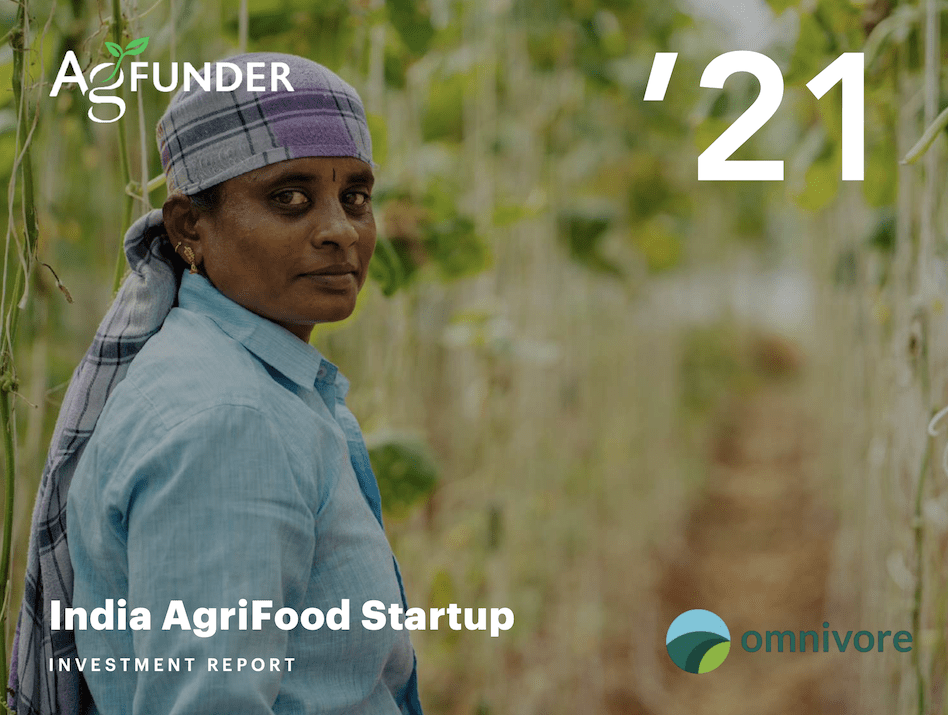Disclosure: AgFunder is AFN’s parent company.
Covid-19 has battered the Indian economy since it reached the country’s shores around the start of fiscal year 2020-2021 (FY21). India went into one of the world’s strictest — and largest — lockdowns, with hundreds of millions of people told to shelter in place. Consumption dipped, factories and farm fields alike were devoid of laborers, supply chains ground to a halt, and the economy slowed.
In spite of all this, India experienced an explosion in agrifoodtech venture funding between April 2020 and March 2021 – the period covered by the latest edition of AgFunder’s ‘India AgriFood Startup Investment Report,’ released today.
According to the report — compiled in partnership with leading Indian agrifoodtech VC Omnivore — Indian agrifood startups saw a year-on-year jump in total funding of almost 100%, securing a total of $2.1 billion. Seed investments into the sector grew 3x as entrepreneurs and investors alike tried to make the most of the opportunity to solve food system failings that have been pushed under the spotlight by the pandemic.
Food delivery fuels overall growth
Restaurant Marketplaces and eGrocery — AgFunder-defined categories which broadly cover meal delivery apps and online grocery shopping, respectively — witnessed about 2x growth in funding in FY21, as millions of Indian consumers shifted to purchasing prepared food, groceries, and other essentials online.
Food delivery giant Zomato alone raised $1.2 billion across several rounds ahead of its $12.1 billion IPO in July, accounting for more than half of total investment into agrifood startups in FY21 and two-thirds of total funding to downstream categories, according to the ‘India Agrifood Startup Investment Report’.
Restaurant Marketplaces remained the leading category in terms of dollars invested, raising $1.33 billion, or 64% of FY21’s agrifoodtech total. However, amid an overall economic slowdown and the tightening of purse strings by consumers, the Premium Branded Foods & Restaurants and Online Restaurants & Mealkits categories saw a dip in investment.
Premium Branded Foods & Restaurants — a special category AgFunder includes in its India and China reports to account for premium food experience offerings that play a role in consumption upgrade — raised $88 million in FY21, down from $168 million in FY20. Online Restaurants & Mealkits scored $64 million in FY21 compared to FY20’s $156 million – though Covid-19 did drive more investment into cloud kitchen startups, which are included in this category.
Upstream technology deals overtake downstream
Closer to the farm, the number of upstream agrifoodtech deals surpassed downstream deals in India for the first time. Agribusiness Marketplaces, which provide farmers with online access to a variety of offline products and services, rose to prominence; leading the pack was DeHaat, which raised two consecutive rounds – a $12 million Series A and a $30 million Series B – from investors including AgFunder, Omnivore, Prosus, Sequoia Capital, and FMO.
However, it was Midstream Technologies that saw the most funding activity. Startups including Arya, Waycool, and Jumbotail raised mega-rounds in FY21, driven by the need to improve efficiency in India’s fragmented and outdated supply chains, which were hit hard by Covid-19.
During the pandemic, agrifoodtech entrepreneurs were responsible for keeping smallholder farmers and food supply chains afloat. While big-ticket funding in India has typically been concentrated on consumer-facing enterprises, investors are discovering a wealth of untapped opportunity further up the agrifood value chain. Also, improved awareness among generalist VC funds is evident from their increasing participation in upstream deals – a trend we believe will continue in the coming years.





